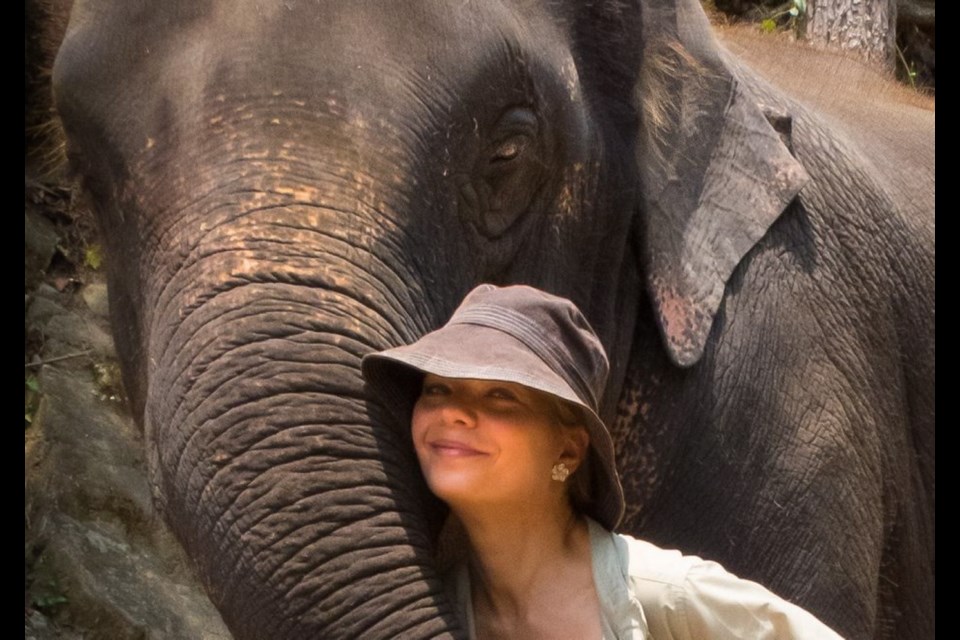Patricia Sims doesn’t feel the least bit uncomfortable if there’s an elephant in the room, as there will be, both literally and figuratively, at the Robert Bateman Centre tonight.
The Victoria-based filmmaker’s passion for elephants is particularly obvious today, World Elephant Day.
“You should see my inbox. It’s full of elephant news every day,” said Sims, who, on Aug. 12, 2012, launched the global initiative with Thailand’s Elephant Reintroduction Foundation.
The World Elephant Day co-founder now leads the rallying call to support dozens of wildlife organizations worldwide that heighten awareness and take action to stop illegal poaching and the ivory trade, protect wild elephant habitats and so on.
“Issues continue to escalate for elephants,” said Sims, who will talk about her adventures with elephants at tonight’s sold-out Spend an Evening with Elephants event.
“Maybe the biggest is loss of habitat, because, whether it’s in Asia or Africa, elephants are running out of room. Protected areas are becoming fewer and fewer.”
The award-winning filmmaker will also screen Return to the Forest, the half-hour documentary she made with longtime creative collaborator Michael Clark. Narrated by William Shatner, an elephant advocate, the film explores the plight of captive Asian elephants in Thailand that are on the verge of extinction.
It’s a prologue to When Elephants Were Young, their upcoming feature-length documentary, also narrated by Shatner, that follows Wok, a young Bangkok street beggar, and his young elephant, Nong Mai.
“We followed their lives for a couple of years. It’s a very heartfelt, tender story about their connection,” said Sims, whose preconceived ideas about why people live with captive elephants were shattered.
“It’s about how elephants are so similar to humans, through their emotions and intelligence. Their lives are quite linked with ours, with a complexity of social behaviours.”
After learning about the Elephant Reintroduction Foundation’s goal of releasing captive elephants into protected forest habitats, Sims was inspired to launch World Elephant Day.
“It’s grown immensely from our first year,” said Sims, whose global social media campaign reached three million people last year.
It promped participation by 150 organizations and input from celebrities including Ricky Gervais, Paul McCartney, Billy Joel, Meryl Streep and wildlife conservationist Jane Goodall.
This year, The Nature Conservancy, based in Arlington, Virginia, signed on as an official sponsor as part of its #SaveTheElephants campaign, encouraging supporters to raise funds by creating elephant art.
An estimated 30,000 African elephants are slaughtered each year to supply the illegal ivory trade. Fewer than 45,000 Asian elephants remain, Sims said.
Research indicates that, if current trends continue, elephants in Africa would be extinct by 2025.
“What’s cool is how social media has transformed this into real-world activity,” said Sims, whose Victoria event is one of several events being held worldwide today.
A Canadian highlight is a concert in Toronto by musicians featured on the soundtrack for When Elephants Were Young in advance of its international film festival circuit rollout.
The word is being spread globally through hashtags such as #worldelephantday, #ivorycrush, #96elephants, #elegram, #killthetrade and #natureismagic.
Sims is often asked why locals should care about the plight of these magnificent creatures, whose dwindling habitats are thousands of kilometres away.
“We have this fantastic affinity with them,” said Sims. Many people who love elephants aren’t aware of their survival crisis, she added.
“It’s all part of the collective living system of the earth. They’re part of our global heritage, and it does matter that they’re getting wiped out. It’s the same as our issues with grizzlies and polar bears.”
Sims and Clark narrowly escaped death while making their film last summer. They were en route to the Sublangka Wildlife Sanctuary in Thailand to film four newborn wild elephants when their SUV was hit by another vehicle on a mountain highway, sending them through a barrier.
Sims’ vehicle flipped into the air and landed on its roof, with its rear facing down the mountain. Sims and the film gear were thrown out the back. The vehicle rolled 120 metres down a steep sloping mountain, with Clark and their Thai driver buckled in, toward the edge of a cliff. But the SUV hit a tree in a gulch and came to a halt, allowing Clark and the driver to climb out with just cuts and bruises.
“It was a dramatic accident and a miracle we were not killed,” said Sims, who suffered fractured ribs, herniated discs and internal injuries.
The health-conscious filmmaker attributes her successful, albeit gradual, recovery to her fitness.
“It’s incredible what we put ourselves through making films when you get into these situations where you become so passionate. So much goes into making an independent doc. They do become labours of love.”
worldelephantday.org
